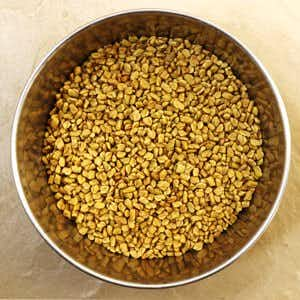
Q. My mother had been bothered with burning feet for some time, and we had not found a solution till recently.
We suspected that the burning was related to her type 2 diabetes and I’d read somewhere that fenugreek helps blood sugar. She tried the fenugreek, and it works!
It is the only thing that ever has. What can you tell us about this?
A. We hope your mother is under medical care for her diabetes. Fenugreek is one of several herbs that can help with blood sugar control under a doctor’s supervision.
Fenugreek
Fenugreek is from a plant (Trigonella foenum-graecum) native to the Mediterranean region, the Ukraine, India and China. Folk wisdom claims that it is good for colds as well as high blood sugar. Animal experiments confirm that it can help keep blood sugar from spiking after a meal. They also demonstrate that it can lower cholesterol and help heal stomach ulcers.
Our Guide to Managing Diabetes describes other supplements and dietary approaches that can be helpful. Herbal approaches such as bitter melon, cinnamon, fenugreek or nopal cactus can be used so long as blood sugar is monitored appropriately.
Vitamin B12 Deficiency
The sensation of burning feet can sometimes result from vitamin B12 deficiency, a possible consequence of the diabetes drug metformin. Please have her doctor test to make sure she has adequate vitamin B12 on board. If she is deficient, she will probably need a supplement to overcome the problem.
Benfotiamine
Your mother’s foot pain might be due to diabetes-related nerve damage. Neuropathy associated with diabetes is sometimes helped by taking benfotiamine. This is a derivative of another B vitamin, thiamine. The dose for neuropathy pain is 300 mg twice a day for the first several weeks, dropping to a maintenance dose of 150 mg twice daily. There was a placebo-controlled trial of benfotiamine for diabetic neuropathy that found it helpful (Experimental and Clinical Endocrinology and Diabetes, Nov. 2008).

